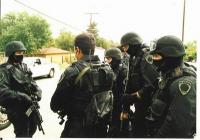-
GOP lawmakers draft bill to bolster Visa Waiver security

About twenty million people use the Visa Waiver program to come to the United States every year. A bill being considered in the House would block anyone who has traveled to Syria, Iraq or a few other nations in the past five years from participating in the Visa Waiver program. It would also require the United States to collect more information about those who avail themselves of the program, codifying a policy already in place.
-
-
A woman’s involvement makes San Bernardino shooting rare among mass shootings

The shooting in San Bernardino, California marked the 355th mass shooting in the United States in fewer than as many days in 2015. As details emerge regarding the events, it is clear that these types of crimes are morphing and not abating. “Shootings involving mission-oriented females may be a new threshold which should be concerning to all of us, and the incident in San Bernardino might just be a hybrid, and a harbinger, of shootings to come,” says an expert.
-
-
Governments should turn to academics for advice on radicalization, religion and security
Western governments are deploying a range of strategies and tactics to deal with the threat posed by the so-called Islamic State. David Cameron is recruiting more spies, and parliament is discussing profound changes to the way in which digital intelligence is collected. But we must not ignore the invaluable supply of knowledge and insight available from our men and women in academia. Research can provide evidence-based context to contemporary challenges, including an enlightened understanding of the place of religion and faith in a security context. We can stop mistakes being made in terms of misguided policies and knee-jerk reactions. And researchers can help the design and deployment of interventions that make a real difference, focusing limited resources effectively.
-
-
Tashfeen Malik pledged allegiance to ISIS

Tashfeen Malik, one of the two attackers who killed fourteen people in a San Bernardino social service center, used her smartphone to post a pledged allegiance on her Facebook page to Abu Bakr al-Baghdadi, ISIS leader – and officials say that timeline of the attack shows that she posted her message while driving with her husband, Syed Rizwan Farook, in the black SUV in the moments after the attack. The two were killed in a shootout with the police about two hours later.
-
-
Syed Rizwan Farook was in touch by phone, social media with “international terrorism subjects”: FBI
Syed Rizwan Farook, the 28-year man who, with his wife, killed fourteen and injured twenty-one people in a San Bernardino social service center Wednesday, had reportedly been in contact with at least two international terrorism subjects who were already being monitored by the FBI. Farook had been in touch with these international terrorism figures on social media, and that he had also contacted them by phone on several occasions. Law enforcement agencies say the motive for the deadly attack is still to be ascertained.
-
-
DHS, NYPD train on response to active shooters

After months of coordination between the Department of Homeland Security (DHS) Science and Technology Directorate (S&T) and the New York Police Department (NYPD) Counter Terrorism Division, the NYPD conducted an active shooter training exercise on 22 November. S&T says that the exercise not only tested their training and proficiency, but also allowed them to incorporate several commercial technologies that could benefit future emergency situations.
-
-
EU Internet Forum launched to fight radicalization, terrorist content online

The EU earlier this week launched the EU Internet Forum. The aim of the forum is to bring together EU interior ministers, high-level representatives of major Internet companies, Europol, the EU counterterrorism coordinator, and the European Parliament. The EU says that the goal is to reach a joint, voluntary approach based on a public-private partnership to detect and address harmful material online.
-
-
Good apps talking to bad Web sites behind your back

In one of the first studies to analyze behind-the-scenes behaviors of good applications, researchers conducted a large-scale analysis of URLs embedded in 13,500 free android apps downloaded from Google Play. The apps tested were created by reputable developers and downloaded by many people, among them popular social media, shopping, news and entertainment apps. The researchers found that almost 9 percent of popular apps downloaded from Google Play interact with Web sites that could compromise users’ security and privacy; 15 percent talked to bad Web sites (with intentions that vary from harming devices, stealing confidential data or annoying users with spam); and 73 percent talked to low-reputation Web sites(those receiving a Web of Trust rating lower than 60/100).
-
-
Husband and wife, identified as San Bernardino attackers, killed in shootout with police

Police shot and killed a husband and wife, both in their late 20s, after the two killed fourteen people and injured seventeen at the Inland Regional Center, a social service center in Sam Bernardino, a working-class community of 200,000 residents about sixty miles east of Los Angeles. The two were identified as Syed Rizwan Farook, 28, and his Tashfeen Malik, 27 (some reports noted that it was not clear whether or not the two had actually married). The couple had a 6-month old daughter.
-
-
U.K. attacks ISIS oil targets in first British military action in Syria

In the first British military strikes in Syria, four British Tornados have dropped precision munitions on seven ISIS targets in eastern Syrian. All of the targets were part of the Islamist organization’s oil production and distribution system. The planes left on their mission from the RAF Akrotiri airbase in Cyprus less than an hour after the House of Commons authorized a U.K. military campaign to destroy ISIS targets in Syria. The United Kingdom has already been part of the U.S.-led coalition against ISIS, but British military strikes were limited to attacking ISIS targets in Iraq.
-
-
Texas sues to block resettlement of Syrian refugees

The Texas Health and Human Services Commission on Wednesday filed suits in federal court against the U.S. State Department, the International Rescue Committee (IRC), and other organizations as part of the state effort to block the resettlement of Syrian refugees in Texas.
-
-
Large-scale face-search technology helps in fighting crime, terrorism

The rapid growth in surveillance cameras is resulting in millions of face images and videos captured every day. The ability quickly and accurately to search all these images to assist in identifying criminal and terrorism suspects is an important and complex task that can contribute to making communities safer. To help in this effort, MSU has licensed its large-scale, automatic face-search system to NEC Corp.
-
-
ISIS sympathizers in U.S. differ widely in background, motivation: Study
A new study offers what its authors describe is the first comprehensive review of Americans who have been recruited by the Islamic State of Iraq and Syria (ISIS). The report examined more than 7,000 pages of legal documents related to the seventy-one individuals charged with ISIS-related activities in the United States. It found that the profiles of individuals involved in ISIS-related activities in the United States differ widely in race, age, social class, education, and family background. Their motivations are equally diverse.
-
-
PLO terrorists tortured captured Israeli athletes in 1972
Forty-three years ago, on 5 September 1972, Palestinian terrorists affiliated with the PLO broke into a dormitory building in the athletic village in Munich, where the 1972 Olympic Games were being held, and captured eleven Israeli athletes. They killed two of them, and negotiated with the German government for the release of the other nine. The terrorists killed the nine athletes at the Munich airport during a botched German rescue attempt. A new documentary movie, to be released early next year, reveals that the Israeli Olympic team members were not only severely beaten, suffering broken bones, but that one of the athletes was castrated.
-
-
Major reorganization at CBP: Two new offices created
U.S. Customs and Border Protection (CBP) has been significantly reorganized, according to a recent internal agency memo. CBP’s current four Operations Offices, however, will not be a part of the reorganization. These four offices, which employ 75 percent of CBP’s total workforce, include the Office of Field Operations, the U.S. Border Patrol, Air and Marine Operations, and the Office of International Trade. New offices in the proposed reorganization include Operations Support and Enterprise Services. The CBP reorganization comes in the wake of an unprecedented CBP scandal.
-
More headlines
The long view
Factories First: Winning the Drone War Before It Starts
Wars are won by factories before they are won on the battlefield,Martin C. Feldmann writes, noting that the United States lacks the manufacturing depth for the coming drone age. Rectifying this situation “will take far more than procurement tweaks,” Feldmann writes. “It demands a national-level, wartime-scale industrial mobilization.”
No Nation Is an Island: The Dangers of Modern U.S. Isolationism
The resurgence of isolationist sentiment in American politics is understandable but misguided. While the desire to refocus on domestic renewal is justified, retreating from the world will not bring the security, prosperity, or sovereignty that its proponents promise. On the contrary, it invites instability, diminishes U.S. influence, and erodes the democratic order the U.S. helped forge.
Fragmented by Design: USAID’s Dismantling and the Future of American Foreign Aid
The Trump administration launched an aggressive restructuring of U.S. foreign aid, effectively dismantling the United States Agency for International Development (USAID). The humanitarian and geopolitical fallout of the demise of USAID includes shuttered clinics, destroyed food aid, and China’s growing influence in the global south. This new era of American soft power will determine how, and whether, the U.S. continues to lead in global development.
Water Wars: A Historic Agreement Between Mexico and US Is Ramping Up Border Tension
As climate change drives rising temperatures and changes in rainfall, Mexico and the US are in the middle of a conflict over water, putting an additional strain on their relationship. Partly due to constant droughts, Mexico has struggled to maintain its water deliveries for much of the last 25 years, deliveries to which it is obligated by a 1944 water-sharing agreement between the two countries.
How Disastrous Was the Trump-Putin Meeting?
In Alaska, Trump got played by Putin. Therefore, Steven Pifer writes, the European leaders and Zelensky have to “diplomatically offer suggestions to walk Trump back from a position that he does not appear to understand would be bad for Ukraine, bad for Europe, and bad for American interests. And they have to do so without setting off an explosion that could disrupt U.S.-Ukrainian and U.S.-European relations—all to the delight of Putin and the Kremlin.”
How Male Grievance Fuels Radicalization and Extremist Violence
Social extremism is evolving in reach and form. While traditional racial supremacy ideologies remain, contemporary movements are now often fueled by something more personal and emotionally resonant: male grievance.
